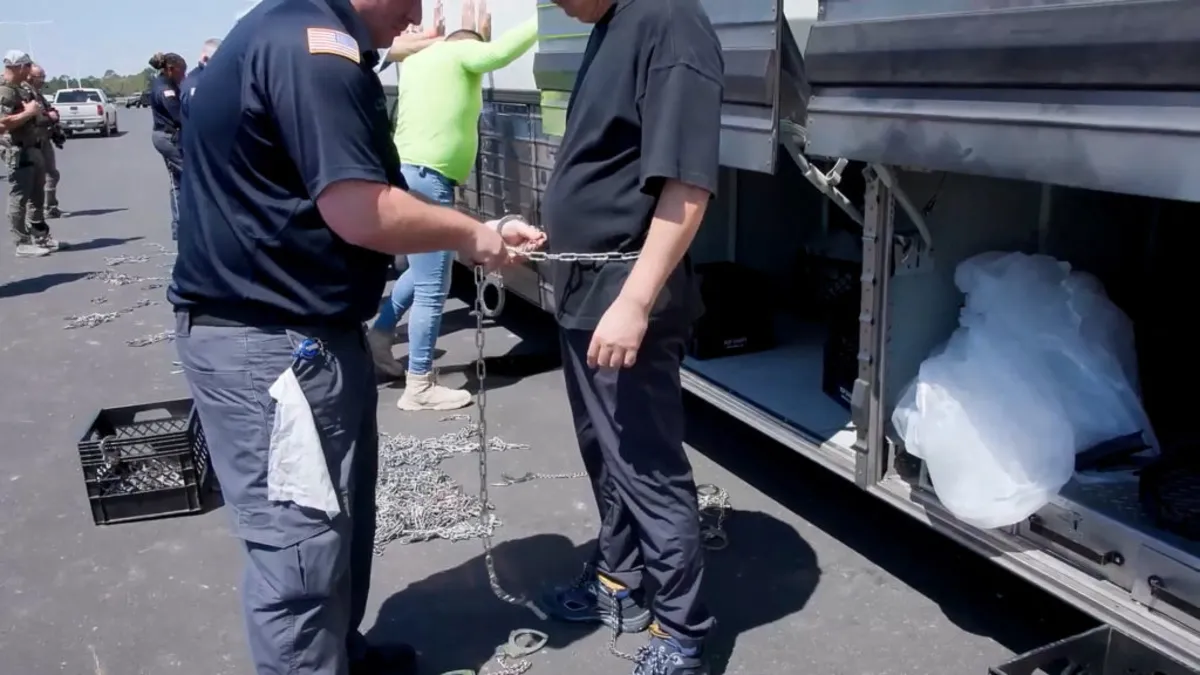
More than 300 South Korean workers who were detained during an immigration raid at a Georgia battery factory have left Atlanta, heading back to South Korea. The workers departed shortly before noon on Thursday, following their transportation from southeast Georgia to Atlanta earlier that day. They are expected to arrive in South Korea by Friday afternoon, as confirmed by South Korea’s Foreign Ministry.
The immigration raid occurred at Hyundai's extensive auto plant located west of Savannah on September 4, resulting in the arrest of over 300 workers. The Foreign Ministry reported that U.S. authorities released 330 detainees, including 316 South Koreans, along with 10 Chinese nationals, three Japanese nationals, and one Indonesian. After some initial delays, the flight for the Korean workers was rescheduled and back on track.
The South Korean government took immediate steps to ensure the safe return of the detained workers. A Korean Air Boeing 747-8i flew from Seoul to Atlanta specifically to repatriate them. The workers had been held at an immigration detention center in Folkston, Georgia, which is approximately 285 miles from Atlanta. South Korean officials engaged in negotiations with U.S. authorities to secure “voluntary” departures for the workers, aiming to avoid deportations that could hinder their ability to return to the U.S. for up to 10 years.
During a recent visit to Washington, South Korean Foreign Minister Cho Hyun met with U.S. Secretary of State Marco Rubio to discuss the situation. He expressed concern over the distress caused to the workers, particularly due to the public release of videos showing their arrests. Cho urged the U.S. administration to assist in facilitating a swift departure for the workers without the use of handcuffs and to prevent future reentry issues.
In light of these events, South Korean President Lee Jae Myung addressed the potential impact on future investments from Korean companies during a speech marking 100 days in office. He indicated that South Korean companies may hesitate to invest further in the U.S. unless there are improvements to the U.S. visa system that would allow skilled workers from South Korea to work at industrial sites. Lee emphasized the need for a streamlined visa process to facilitate the necessary workforce for projects in the U.S.
U.S. authorities have claimed that the detained workers were “unlawfully working” at the plant. However, attorney Charles Kuck, representing several detainees, argued that most of the South Korean workers were engaged in activities permissible under the B-1 business visitor visa program. This visa allows foreign workers to stay for up to six months, with specific limitations on the type of work they can perform, such as supervising construction projects or installing equipment.
Additionally, South Korea is among the 41 countries eligible for the U.S. Electronic System for Travel Authorization (ESTA), which provides visa waivers for travelers with legitimate purposes for their visit. This system essentially grants them B-1 visa status for a period of up to 90 days.
The raid targeted one of Georgia’s most significant manufacturing sites, praised by state officials as the largest economic development project in the state’s history. The Hyundai Motor Group initiated electric vehicle (EV) manufacturing at the $7.6 billion plant just a year ago, employing approximately 1,200 individuals. In a statement, the governor’s office reaffirmed its strong relationship with the Republic of Korea, highlighting a 40-year partnership that began with the establishment of Georgia’s trade office in Seoul.
As developments continue following this immigration raid, both South Korean officials and the U.S. authorities are navigating the complexities of immigration policies and economic partnerships, which will undoubtedly shape future relations and investments.